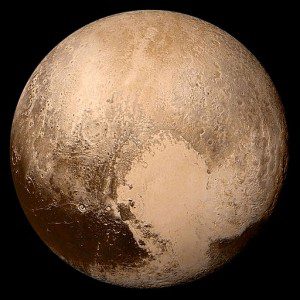 The recent space probe to Pluto revealed it to be no mere frozen rock but a complex world. Now NASA scientists involved with that project are proposing a new definition of “planet” that would restore Pluto to its former planetary status.
The recent space probe to Pluto revealed it to be no mere frozen rock but a complex world. Now NASA scientists involved with that project are proposing a new definition of “planet” that would restore Pluto to its former planetary status.
Possible problems: The new definition would also make the Earth’s moon a planet. Also 110 other celestial bodies in our solar system.
But read the reasoning after the jump.
From Mike Wall, Will Pluto Get Its Planethood Back?, Space.com:
Advocates of Pluto’s planethood are about to fire another salvo in the decade-long debate about the famous object’s status.
Scientists on NASA’s New Horizons mission, which performed the first-ever flyby of Pluto in July 2015, will officially propose a new definition of “planet” next month, at the 48th Lunar and Planetary Science Conference in The Woodlands, Texas.
The new definition would replace, or supersede, the one devised by the International Astronomical Union (IAU) in 2006. A planet, the IAU determined, is a body that orbits the sun without being the moon of another object; is large enough that its own gravity has rounded it into a sphere (but not so large that it undergoes fusion reactions, like a star); and has “cleared its neighborhood” of most other bodies.
Pluto failed to meet this last criterion, because its neighborhood — the vast Kuiper Belt beyond Neptune’s orbit — is full of small, icy objects. So Pluto was stripped of the planethood it had enjoyed since its 1930 discovery, and was reclassified as a dwarf planet.
Many scientists and laypeople alike cried foul at the time, and have continued to object to the definition and Pluto’s concomitant “demotion.” The New Horizons team members, including mission principal investigator Alan Stern, lay out their main arguments against the IAU definition in the paper they will present next month:
“First, it recognizes as planets only those objects orbiting our sun, not those orbiting other stars or orbiting freely in the galaxy as ‘rogue planets,'” the researchers, led by K.D. Runyon of Johns Hopkins University in Baltimore, wrote in the paper, which you can read here. “Second, it requires zone clearing, which no planet in our solar system can satisfy since new small bodies are constantly injected into planet-crossing orbits, like NEOs [near-Earth objects] near Earth. Finally, and most severely, by requiring zone clearing, the mathematics of the definition are distance-dependent, requiring progressively larger objects in each successive zone. For example, even an Earth-sized object in the Kuiper Belt would not clear its zone.”
[Keep reading. . .]
Photo of Pluto in true color by NASA / Johns Hopkins University Applied Physics Laboratory / Southwest Research Institute [Public domain], via Wikimedia Commons
 The recent space probe to Pluto revealed it to be no mere frozen rock but a complex world. Now NASA scientists involved with that project are proposing a new definition of “planet” that would restore Pluto to its former planetary status.
The recent space probe to Pluto revealed it to be no mere frozen rock but a complex world. Now NASA scientists involved with that project are proposing a new definition of “planet” that would restore Pluto to its former planetary status.













